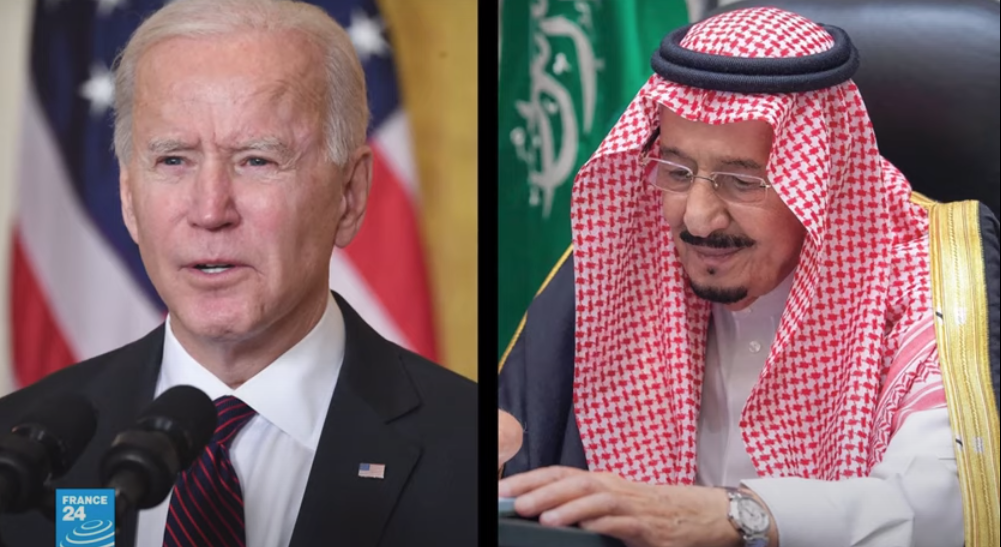The surprise move by Saudi Arabia, in coordination with the PA, has raised eyebrows in the United States and Israel.
On August 12th, Nayef bin Bandar al-Soudeiri, the designated ambassador, formally presented his credentials to Majdi Al-Khaldi, an advisor to PA Chairman Mahmoud Abbas, at the Palestinian embassy in Amman.
In a noteworthy development, a joint committee is expected to be established between Saudi Arabia and the PA, aimed at solidifying their relations.
An upcoming official ceremony is anticipated, during which the new Saudi ambassador will present his credentials to PA Chairman Mahmoud Abbas.
This audacious maneuver by Saudi Arabia has profound implications.
Senior PA officials contend that Saudi Crown Prince Mohammed bin Salman’s actions are shaping a new political landscape even prior to the conclusion of negotiations with the United States and the execution of the envisaged three-way agreement.
Implicit in this move is Saudi Arabia’s recognition of an independent Palestinian state, with East Jerusalem as its capital.
This strategic maneuver appears to exert pressure on President Biden, with the underlying message that endorsing this new status quo is pivotal for advancing normalization between Israel and Saudi Arabia.
In a surprising twist, Israel finds itself taken aback by Saudi Arabia’s actions. Both Foreign Minister Eli Cohen and the head of the National Security Council, Tzachi Hanegbi, asserted in interviews with Israeli media that the opening of a Saudi consulate in East Jerusalem is unacceptable.
This situation underscores the commanding position of Saudi Crown Prince Mohammed bin Salman in negotiations with the Biden administration concerning the tripartite deal involving Israel.
Bin Salman seemingly wields significant leverage, assuming President Biden’s desire to strengthen his political standing ahead of impending presidential elections.
Additionally, the attempt to counter China’s increasing influence in the Middle East plays a pivotal role in these deliberations.
China’s mediation between Saudi Arabia and Iran, along with burgeoning economic ties, has established it as a key regional player.
Statements made by Saudi Ambassador Naif bin Bandar al-Soudeiri in an August 14th interview with “A-Sharq Al-Awsat” further corroborate this trend.
Al-Soudeiri emphasized Saudi Arabia’s evolving role as an influential global and regional power, aligned with its support for “Palestine“.
President Biden’s initial stance towards Saudi Arabia, especially following the tragic murder of journalist Jamal Khashoggi, was marked by a degree of misunderstanding.
His inclination to distance the United States from Saudi Arabia is undergoing recalibration, particularly given the evolving global dynamics stemming from the Ukraine conflict and fluctuating energy prices.
Crown Prince Mohammed bin Salman appears to perceive President Biden’s current predicament and is capitalizing on it.
A security agreement with Saudi Arabia is vital for President Biden, and the Crown Prince is adeptly maneuvering negotiations to his advantage.
Employing a gradual approach, reminiscent of the “Salami tactic,” he may extend negotiations with the Biden administration until after the U.S. presidential elections, thus maximizing his gains.
Internally, the Saudi royal family seeks to fortify the kingdom’s defense capabilities, anticipating the fragility of its accord with Iran and aspiring to secure advanced weaponry and nuclear technology from the U.S.
On a broader scale, Crown Prince Mohammed bin Salman aspires to orchestrate a breakthrough in Palestinian-Israeli relations, possibly setting the stage for a Palestinian state.
Saudi officials recognize Prime Minister Netanyahu’s keenness for normalization with their country and are leveraging this for strategic gain.
Given Saudi Arabia’s symbolic importance in the Islamic world, a normalization agreement with Israel could potentially signify Islamic recognition of the State of Israel. Such a landmark move could pave the way for other Arab and Muslim nations to follow suit.
PA officials suggest that Crown Prince Mohammed bin Salman may exert pressure on the Biden administration to prompt Israel into freezing settlements, committing to an independent Palestinian state with East Jerusalem as its capital, and translating these commitments into tangible actions.
Bin Salman’s strategic objective could be to neutralize the prospect of Judea and Samaria’s annexation by Israel, ensuring comprehensive Palestinian sovereignty in East Jerusalem and the Al-Aqsa Mosque.
This, in turn, might facilitate his bid for influence over the Temple Mount area, adjacent to or in place of Jordan’s current involvement.
Sources within the Fatah movement allude to statements by Saudi Foreign Minister Faisal bin Farhan, indicating that lasting Middle East stability necessitates restoring Palestinian hope, dignity, and their right to self-determination.
Considering these developments, the Israeli government confronts a complex array of political and security decisions.




